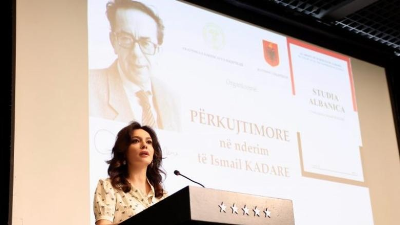
© https://shqiptarja.com/
В Албанії вшанували пам’ять Ісмаїла Кадаре (1936–2024) — класика світової літератури, якого справедливо називають голосом нації. У річницю його смерті парламент країни та Академія наук провели офіційні урочистості, а спікерка парламенту Еліса Спіропалі назвала Кадаре «вічною іконою албанської думки та духу» та «паспортом Албанії у світ у часи ізоляції». Кадаре залишив по собі масштабну літературну спадщину — понад 80 творів: романів, поезій, есеїв. Його книжки перекладено більш ніж 45 мовами. Він був неодноразово номінований на Нобелівську премію з літератури, а також відзначений престижними міжнародними нагородами — Man Booker International Prize (2005), Premio Principe de Asturias (2009), Neustadt International Prize for Literature (2020). У 2023 році він отримав найвищу нагороду Франції — Орден Почесного легіону в ступені офіцера. Свою літературну кар’єру Кадаре почав у 1954 році зі збірки Frymëzime djaloshare («Юнацьке натхнення»). Однак справжнє визнання йому приніс роман The General of the Dead Army («Генерал мертвої армії», 1963), перекладений на десятки мов світу й включений до списку 100 найвизначніших книг ХХ століття за версією Le Monde.
Серед інших визначних творів:
-
The Castle («Фортеця», 1970) — роман про облогу Середньовічної Албанії османами;
-
Chronicle in Stone («Хроніка в камені», 1971) — автобіографічна проза про війну очима дитини;
-
The Palace of Dreams («Палац мрій», 1981) — глибока антиутопія, заборонена одразу після виходу;
-
The Pyramid («Піраміда», 1992) — сатира на культ влади та диктаторський контроль;
-
The Successor («Наступник», 2003) — блискуча політична алегорія про спадкоємця комуністичного лідера.
Протягом десятиліть Ісмаїл Кадаре залишався головним літературним голосом Албанії — як у роки тоталітаризму, так і після падіння режиму. Його твори вишукано поєднують міф, історію та сучасність. Через алегорію він порушував теми цензури, національної ідентичності та внутрішньої свободи, пропонуючи унікальний «балканський модернізм». До першої річниці смерті письменника у його будинку-музеї в Тирані відкрили експозицію з рідкісних перших видань, зокрема оригінального примірника Frymëzime djaloshare.
The Voice of Freedom: Albania Marks the Anniversary of Ismail Kadare’s Death
Albania has commemorated the literary giant Ismail Kadare(1936–2024), a towering figure of world literature, widely regarded as the voice of the Albanian nation. On the first anniversary of his passing, the Albanian Parliament and the Academy of Sciences held an official tribute, during which Speaker Elisa Spiropali hailed Kadare as an eternal icon of Albanian thought and spirit and Albania’s passport to the world in times of isolation. Kadare left behind an immense literary legacy: more than 80 works, including novels, poetry collections, and essays. His books have been translated into more than 45 languages. He was repeatedly nominated for the Nobel Prize in Literature and honoured with some of the most prestigious international literary awards: the Man Booker International Prize (2005), the Prince of Asturias Award for Literature (2009), and the Neustadt International Prize for Literature (2020). In 2023, he was awarded the Légion d’honneur at the rank of Officer, France’s highest state distinction. Kadare began his literary journey in 1954 with the poetry collection Frymëzime djaloshare (“Youthful Inspirations”). However, his international breakthrough came with the novel The General of the Dead Army (1963), which was translated into dozens of languages and named one of the 100 greatest books of the 20th century by Le Monde.
Selected Works:
-
The Castle (1970) — a novel depicting the Ottoman siege of medieval Albania
-
Chronicle in Stone (1971) — an autobiographical narrative of war seen through a child’s eyes
-
The Palace of Dreams (1981) — a profound dystopian novel banned shortly after publication
-
The Pyramid (1992) — a biting satire on authoritarianism and the cult of power
-
The Successor (2003) — a political allegory about the shadowy fate of a communist heir
For decades, Ismail Kadare was Albania’s principal literary voice, both during the totalitarian era and after the fall of the regime. His writing masterfully blended myth, history, and modernity. Through allegory, he addressed issues of censorship, national identity, and personal freedom, creating what has often been described as a distinct form of Balkan modernism. On the anniversary of his death, an exhibition featuring rare first editions, including an original copy of Frymëzime djaloshare, was unveiled at his house-museum in Tirana. The event served as a symbolic tribute to his enduring influence across generations and his unmatched devotion to the written word.

©
1735